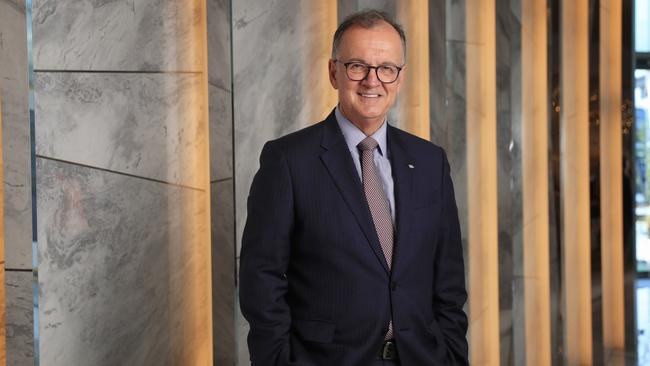Switkowski blames ‘aggressive growth’ plans for shocking PwC tax leak scandal
Ziggy Switkowski’s long-awaited report into the culture at PwC Australia found it wanting, with too much focus on money for the firm and its partners.
Business
Don't miss out on the headlines from Business. Followed categories will be added to My News.
PwC Australia’s “aggressive growth agenda” has overshadowed the firm’s values, and it needs to build a better risk framework, and have “greater introspection” and “humility” to restore trust in the firm, according to an independent report by Ziggy Switkowski.
The corporate veteran and former Telstra boss was commissioned by PwC in May to examine the firm’s governance, accountability and culture after a shocking tax leak scandal that exploded into public awareness in February this year.
“The aggressive growth agenda overshadowed and occurred at the expense of the firm’s values and purpose,” Dr Switkowski wrote.
“The focus on ‘whatever it takes’ seems, at times, to have contributed to integrity failures – some partners did the wrong thing, while others failed to do the right thing by overlooking or minimising the significance of questionable behaviours.”
The beleaguered big four accounting firm has been holding onto the report for a month while it considers the implications of Mr Switkowski’s findings and works out how best to respond to its recommendations.
Just hours after releasing the Switkowski report, PwC also released its own “statement of facts” in which it reported three other times that PwC partners had shared confidential government information.
Those breaches related to GST treatment of digital currencies, the Treasury’s Black Economy Taskforce, and the sharing of confidential Chartered Accountants Australia and New Zealand information.

In his first round of interviews since being shipped in from PwC Singapore in July to run the troubled Australian operations, Kevin Burrowes apologised for the past behaviours.
“It’s quite clear that over time, there’s been a failure of leadership and that contributed to an erosion of good governance and culture, and a weakening of our professional and ethical standards,” Mr Burrowes said.
More used to being behind-the-scenes, PwC and its rivals have faced the public glare of scrutiny since it was revealed that the firm had taken confidential information given to it by the government seeking advice on so-called Google tax laws, and then used that information to pitch high-fee paying work to clients on how to avoid such taxes.
Dr Switkowski was not tasked with identifying who was to blame for the tax breach, or whether subsequent disciplinary action was adequate, but instead what the culture and governance needed to look like going forward.
“The Review identified a number of key shortcomings relating to governance, culture and accountability that have arisen from the accumulation of poor practices, which went unexamined and uncorrected for many years,” Dr Switkowski wrote.
“PwC Australia’s glossy PowerPoint presentations sometimes give a false impression of comprehensive and disciplined structures and processes, when the reality is much less tidy,” he wrote.
The main problems at PwC came down to “lack of independence and external voices,” “excessive power conferred on the CEO,” a “disproportionate focus on revenue growth and market leadership,” a decentralised business model, complexity and fragmentation of that created “ineffective structures and processes,” “unclear responsibilities and accountabilities,” and an “overly collegial culture inhibiting constructive challenge,” he reported.
PwC is now being investigated by the Australian Federal Police, and its behaviour has triggered two federal government inquiries and a NSW state government inquiry. Meanwhile, the federal government has temporarily cut contracts with the firm.
As with many things in life, money has been at the root of some of PwC’s current problems, according to Dr Switkowski, who pointed not just to the remuneration of partners but also the firm’s overall desire for revenue expansion.
“The remuneration outcomes and career arc of any partner, including members of the Board of Partners, may be influenced by more ‘senior’ partners across the firm. Independent thinking may not always be rewarded,” he wrote.
“In recent years, the emphasis on growth coupled with high levels of trust and reluctance to challenge created blind spots. It may also have contributed to a willingness of partners to tolerate poor behaviours of ‘rainmakers’. Against this backdrop, the overplaying of collegiality creates risk.”

In response to the Switkowski report, PwC said it has developed a “action plan” to try to win back the trust of government and corporate clients, along with its own staff.
“The Action Plan is built around five commitments for change, including enhancing the independence and effectiveness of our governance board, embedding a culture and practice of constructive challenge, improving discipline and rigour of decision-making, strengthening risk and incident management accountabilities, and putting our values at the core of everything we do,” PwC said in a statement.
PwC will also apply many of the ASX Corporate Governance Principles and Recommendations, appoint a non-executive chair and at least three non-executive board members, and release audited financial statements by September 2025.
Mr Burrowes, who was appointed to the role after the former chief executive Tom Seymour was directly implicated in the tax scandal, said a global search was underway for a new chair.
“Quite clearly no one would join this firm to take that role until the Switkowski review had been completed,” Mr Burrowes said, adding “we need to look beyond just the borders of Australia. We need to look across Asia and other countries to find really high calibre non-executives to come on board.”
As part of PwC’s statement of facts, the firm delved into how the inquiries by the ATO of Mr Collins emails were not properly followed up, and said it had “erroneously” concluded the concerns raised by ATO second commissioner Jeremy Hirschhon had already been addressed.
The firm also concluded it had not properly recognised the inherent conflict of interest it had in advising the government and clients on the same tax treatments.
“Fundamentally, the confidentiality breaches occurred due to PwC Australia’s failure to recognise and take steps to mitigate the inherent conflict of interest that existed from PwC Australia advising Treasury on the implementation of tax legislation while, at the same time, assisting clients to structure their business operations to comply with the new laws,” PwC said in its statement of facts.
Last week, the government released draft legislation that could result in major consultancy firms receiving fines of up to $780m – a 100-fold increase – for tax promoter breaches and the Australian Taxation Office and the Tax Practitioners Board given expanded roles.
Originally published as Switkowski blames ‘aggressive growth’ plans for shocking PwC tax leak scandal





